Are your emails safe from the ever-growing prying eyes? Unfortunately, the answer is ‘No’ unless you’re using a secure email service from providers respecting your privacy. Protecting your email communications ensures that your personal data can never be misused. The good news is that you can get a secure email service to protect your email activities.
So, if you want your email messages and conversations to remain as private as possible, you’re at the right place. This article lists 15 trusted providers offering the best email services to take your email security to the next level.
Top 5 secure email providers – Quick list
If you’re in a rush to subscribe to one of the most secure email services, here are the five best options you can choose from.
- ProtonMail – An open-source, end-to-end encrypted, freemium platform with zero-knowledge and zero access technology.
- Tuta – Top-notch encryption standards with a user-friendly interface. However, lacks inclusive search features.
- Mailfence – End-to-end encrypted email service supporting encrypted email messages to non-PGP recipients too.
- CounterMail – Stores emails on temporary servers in encrypted form; supports additional protection with USB key. Paid service only.
- Hushmail – Easy-to-use encrypted email service with a premium model and free trial; supports personal and business uses alike.
What are secure email providers?
A private email service differs from conventional email services as it offers additional security features to protect your email account and content. For example, they employ end-to-end encryption and zero-access encryption that encrypts your email throughout the entire journey to the recipient.
Unfortunately, there isn’t any standardization of secure service – so any service can claim to be secure. That is why you should be careful when choosing a secure email service. In particular, pay attention to the encryption and other essential features employed.
How do secure email service providers work?
What makes secure email providers different from regular services is the “security” feature backed by encryption.
Basically, the original email model employed plain text communication between clients and servers. However, despite being faster, it turned out to be an insecure method of communication that was vulnerable to snoopers.
Also, your messages remain exposed to the service providers, who can read everything you communicate. For instance, in certain circumstances, Google reads your emails, and access is always ready. Likewise, the government and surveillance authorities can read your messages, or at least the metadata, to know your activities.
That’s why secure services use encryption protocols to protect your messages.
Primarily, the services use encryption in the following two ways.
Transport-level encryption
Transport-level encryption is powered by TLS – SSL‘s successor- to encrypt emails during transit. Yes, this is the same TLS you frequently encounter while browsing websites.
In the case of emails, TLS applies on top of TCP (Transmission Control Protocol) to protect SMTP (sending email to server) and IMAP (retrieving email from the server) protocols. That’s how it protects messages from the sender to the receiving end, given that the server at both ends supports encrypted communication.
Transport-level encryption basically secures your plaintext emails from hackers and snoopers.
Unfortunately, email services do not always use it by default. Also, you can’t get an idea about its active status the way you can get a hint of it via a padlock with website URLs.
End-to-end encryption
In this case, the email service provider applies encryption from the sender’s “end” to the receiver’s “end” with no intermediary servers involved.
In the case of transport-level encryption, the email provider’s servers control the transmission of secure messages. The servers can store and even read your emails; hence, anyone intercepting or hacking the server can access your messages.
However, in the case of high-level encryption, the encryption begins right at the user’s device – the endpoint. It remains encrypted during the entire transmission to the receiving end (the recipient’s device), with no chance for the server to intercept or read the email. Also, the servers (and the service provider) cannot decrypt your message since the decryption keys only remain private to the sources.
Applying top-class encryption is more secure and easy to use and detect. Thankfully, it comes enabled by default in most secure email services. Also, you can get a clear indicator when the feature is active.
Some common end-to-end encryption protocols include the following.
S/MIME: The Secure/Multipurpose Internet Mail Extensions (S/MIME) is an asymmetric end-to-end encryption protocol that works by verifying senders’ identity via signed certificates from a Certificate Authority.
PGP: Pretty Good Privacy (PGP) is a safer decentralized encryption system that utilizes symmetric and asymmetric protocols. It’s easy to use the services as it doesn’t require the parties to exchange private keys. However, users must rely on third-party services (such as privacy-friendly email clients) for encryption.
Why you should go for encrypted email providers
Although you can encrypt your emails with regular services, that would require additional efforts from your side. And, even after configuring everything, you can’t be sure about achieving privacy for your messages.
That’s where you need a secure email client. Without meddling with technical stuff, you can quickly achieve better email security.
To understand how these email clients serve you, consider these obvious advantages.
Achieve better privacy
Using secure email service providers based in privacy-friendly nations is the easiest way to ensure privacy for your data. The providers in such countries warrant utmost data security, often with zero access they can easily follow due to no mandatory data retention laws. Hence, you can trust that neither your government nor any other surveillance authorities can access your emails. Proton Mail is a classic example of such robust services.
Secure sensitive data within your messages
Emails often include sensitive information such as your bank account details, passwords, and other personally identifiable information. Hence, unwarranted or malicious access to these details can easily make you fall for identity theft and other cybercrimes.
With protected email providers, you can communicate freely via email without worrying about unauthorized access to your data.
Avoid metadata tracking
While you can encrypt your emails with regular services, like Yahoo and Gmail, you remain vulnerable due to unsecured metadata.
Your metadata may not include your full message, but it still includes other important details such as the sender’s details, timestamps, and the overall gist of your message. Even despite encryption, anyone maliciously accessing this data can still get an idea of your email.
Therefore, secure email services are better as they hide your metadata from prying eyes.
Factors to consider before going with a secure email service
Many untraceable email providers are available today, making it overwhelming for anyone to choose the best service.
Some of you may seek a service with the most significant security or robust encryption. In contrast, others may fancy simplicity and convenience.
Thus, to help you pick the best email clients, here are some factors you need to consider.
- Email encryption – Before switching to a provider, ensure the emails are end-to-end encrypted, including attachments.
- Jurisdiction – You should know the service’s location and where it stores your data. These things directly affect user privacy.
- Security and Privacy – Ensure you know the provider’s security standards and policies regarding your data. That is, whether or not it logs your data, why, how, and for how long it stores it.
- Features – Look for essential features such as calendars, inbox search, contacts, and file storage. The best secure email provider should also support DAV services and collaboration tools.
- PGP Support – Some services support PGP, while some don’t use PGP due to the vulnerabilities. It is recommended to go with a PGP-supported secure email client.
- Key Feature – Check if you can import existing contacts and emails. There is no harm in compromising this essential feature for security. But getting both (email security plus essential features) with one provider is an excellent win.
- Email Apps – Due to encryption, most email services won’t be used with third-party email clients. Yet, some offer dedicated apps and prefer such services.
Secure email providers compared
| Providers | Rating | Free version | Free Version storage | Storage | Starting Price | 2FA | End-end encryption | Features | Cons |
|---|---|---|---|---|---|---|---|---|---|
| Protonmail | 4.8 | Yes | 500 MB | 5-20 GB | $3.33/month | Yes | Yes | PGP support, short domain addresses, batch GCD attacks protection, self-destructing messages | Unlimited plan is costly, Web client feels outdated, POP3 is not supported |
| Tuta | 4.8 | Yes | 1 GB | 1-10 GB | $1.20/month | Yes | Yes | Encrypted searches, aliases, calendar | Expensive extra storage, No support for PGP and IMAP, Located in a 14-Eyes country |
| Mailfence | 4.7 | Yes | 500 MB | 5-50 GB | $2.50/month | Yes | No | RSA/ECC encryption, PGP support, Calendar, Built-in digital signatures | Lacks customer support, Some logging |
| CounterMail | 4.5 | No | – | 4GB | $3.29/month | Yes | Yes | RAM-only servers, PGP encryption, Safebox, anonymous payment options, man-in-the-middle (MITM) attack protection | Parent company is in 14-Eyes country, No POP3 support, Limited and Expensive storage, No free version |
| Hushmail | 4.4 | Yes | 15MB | 10GB | $4.17/month | Yes | Yes | Spam filter and autoresponder, Importation of contacts using a CSV file, | Requires use of a different email address and phone number when registering and verifying |
| Runbox | 4.2 | Yes | 200MB | 2GB | $1.66/month | Yes | No | Accepts cryptocurrencies, SMTP/POP/IMAP support, No ads, Intuitive UI | Belongs to country which is a member of 5-Eyes Alliance, No native end-to-end encryption |
| Mailbox | 4 | No | – | 2GB | $1/month | Yes | No | PGP support, cloud-based storage, compatible with Mailvelope, SSL/TLS with PFS, Cloud-based storage, Safeguards against insecure inboxes | No mobile apps, Email metadata not encrypted |
| Posteo | 3.9 | No | – | 2GB | $1.20 | Yes | No | Mailbox encryption, PGP support, Very affordable, Highly customizable, Audited by Cure53, POP/IMAP/SMTP | Limited customer support, No mobile apps |
| StartMail | 3.7 | No | – | 10GB | $2.5/month | Yes | No | Support PGP, IMAP/SMTP support can add multiple aliases, 10GB of encrypted cloud storage | Restrictive trial version, Encryption isn’t end-to-end |
| Disroot | 3.7 | Free | 2GB | 2GB | Free | Yes | No | Open-source software, Allows up to 10 MB of attachments, | Maintained by only volunteers |
| Criptext | 3.4 | Yes | 500 MB | 15GB | Free | Yes | Yes | Unsend email tool, allows sending of emails to non-Criptext users | logs data |
| KolabNow | 3.3 | No | – | 5GB | $11/month | Yes | No | Open-source program, Robust tagging and text search | It only saves its debug report records when necessary |
| FastMail | 3.1 | No | – | 100GB | $3/month | Yes | Yes | user-friendly interface | No free trial or version |
| Librem Mail | 3.5 | Yes | – | 1GB | $7.99/month | Yes | Yes | No ads, Built-in VPN, Decentralized | Completely based on existing free software projects |
| SCRYPTMail.com | 3.2 | Yes | 300 MB | $2/month | Yes | No | Accepts Bitcoin, Generous Storage limits | Slightly expensive paid plans | |
| Titan | 3 | – | 10GB | $1.49/month | Yes | No | Anti-virus check, Integrated contact/calendar/email list | Forwards emails to spam instead of inbox | |
| Zoho Mail | 3.1 | Yes | 5GB | 5-200 GB | $1.00/month | Yes | No | Oauth 2.0, email encryption in rest, one-click migration tools, unusual activity reports | Free versions lack storage, Not ideal for personal use |
| TheXyz Mail | 3 | No | – | 25GB | $2.95/month | Yes | No | Several spam filters, Gmigrattion tools, iOS and Android apps, 50MB attachment cap | Company based in one of the 14-Eyes countries |
| Soverin | 3 | No | – | 25GB | $3.41/month | Yes | Yes | Allows you to send unlimited messages, Robust SSL/TLS encryption | Cloud storage cannot be expanded |
| PrivateEmail | 3.1 | No | – | 5-15GB | $14.88/month | Yes | Yes | Solid PGP encryption, Compatibility across devices, Superb cross-device syncing | Costly plans |
20 secure email providers today
So, now you know what to consider before opting for any secure email service provider. But, of course, it will take a lot of time for you to analyze the bulk of available email services using these parameters.
So, to save you time, below are some of the most private email providers that we hand-picked after testing multiple of them.
The list contains both the free and paid providers. So, you can pick any of these top 15 best email services to protect your privacy, as every email provider mentioned here has robust security..
1. Protonmail
ProtonMail is a Swiss-based, encrypted email provider. It works with iOS and Android mobile applications. The program is built as an open-source service and includes end-to-end encryption.
ProtonMail appeared on the scene following Snowden’s revelations. It is on top of our most anonymous email providers list for good reasons.
The US media has even promoted the service (Forbes, to be specific) as “The Only Email System The NSA Can’t Access.”
They have pride in data centers in under 1000 meters of granite rock, which can survive a nuclear attack.
This secure email service is also designed with the principle of zero knowledge encryption and zero access. That means the staff and email servers cannot read or share your emails.
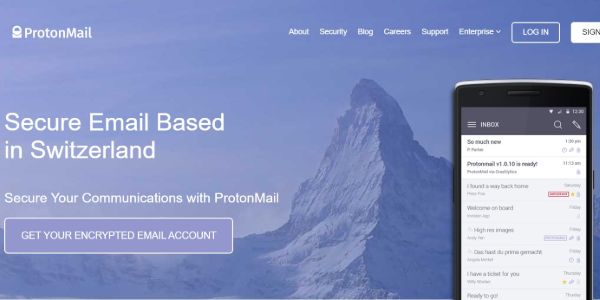
The Proton Mail free trial supports 500 MB of email storage and limits your usage to 150 daily messages. That’s certainly enough for individual users.
However, you can pay for the Plus service for more space, email aliases, priority support, tags, and custom filtering options.
In the Plus plan, you can set automatic responses and send more emails daily alongside built-in VPN protection. A couple of other plans (Professional and Visionary) are also available.
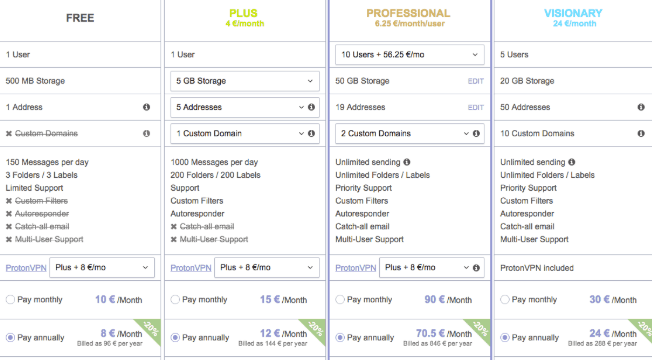
- 500MB free storage as well as 150 emails per day
- Use your very own domain
- Two-step verification
- Free and paid options
- Self-destruct message functionality
- Mobile apps (Android and iOS)
- Swiss-based servers, hence excellent protection from Swiss privacy
- Zero-access construction
- The Premium version is a bit on the expensive side
2. Tuta
Tuta is a well-protected email service based in Germany that values the privacy of its users.
Although their service aims to offer maximum email security, it remains easy to use and has quality features.
Comparing Tuta vs. Proton Mail makes both look similar in terms of design and level of security.
Tuta uses AES and RSA encryption standards. All Tuta emails get encrypted from the sender to the receiver (the email recipient) and decrypted directly on the device. Therefore, the private encryption key is not accessible to anyone else.
An email account is all you need to exchange secure emails with other Tuta users.
For emails encrypted outside the system, you can simply specify a password for the email to be used by recipients when viewing the message in their browser. The very interface also allows them to respond securely.
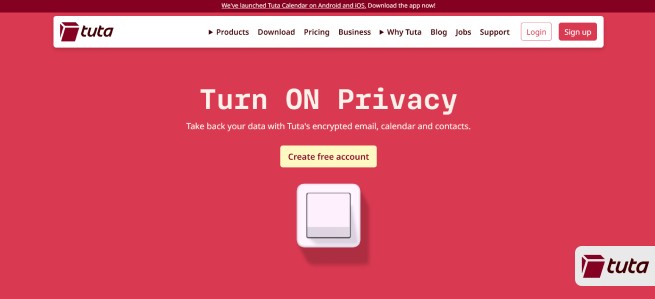
Tuta web interface is easy to use and navigate, allowing you to make an email private or non-private with just one click.
However, there is no search function, so it is impossible to search for previous emails.
You can learn how it works better by reading our Tuta guide.
- Applications for iOS and Android
- No phone number is required for verification
- Automatic encryption of the entire mailbox and address book
- The subject line, headers, body, metadata, and all attachments are automatically encrypted; the IP address is deleted
- Support for spam filtering
- Features like aliases and messaging rules are only available for paid accounts
- Users cannot import contacts in bulk
3. Mailfence
Mailfence, headquartered in Belgium, is a security-focused email provider that has strong security features. Like other providers featured in this article, it offers end-to-end encryption to ensure your email messages remain secure from snoopers.
It is an excellent private email client offering 500 MB file storage for free alongside added features.
On top of standard features, this private email service offers a built-in Keystore, which helps manage your OpenPGP encryption keys. You also get to send encrypted messages to anyone who doesn’t use PGP.
Understandably, paid accounts offer more space and the option to use your domain name for emails.
Mailfence software is not available for inspection as it is not open source. This might undermine the security and confidentiality of the system for some users.

Mailfence stores users’ private encryption keys on its servers. However, they claim that they cannot read it because it is encrypted with users’ passphrases (via AES-256).
The researchers said no root key would allow them to decrypt encrypted messages. A vast number of users online have reported Mailfence to be the most private email service.
- Digital email signatures prove the authorship of the author
- Includes a spam blocker
- Import contacts from Outlook, a CSV file, vCard, LDIF, or Gmail
- Includes a calendar and storage for documents
- Free online storage is limited to 500 MB only
- Requires another email address to receive the activation key
- Private keys are kept on Mailfence servers
- Encrypted emails can only be sent to Mailfence or OpenPGP users
4. CounterMail
CounterMail is a secure email service provider based in Sweden that has been up and running for over 10 years.
For those concerned about email privacy, CounterMail allows the secure execution of OpenPGP-encrypted email with 4096-bit encryption keys in a browser.
CounterMail servers store only encrypted emails.
The Sweden servers do not store your emails on hard drives. Instead, all data gets stored on CD-ROM only.
When someone attempts to alter the server, the data will probably disappear. That helps prevent data leakage.
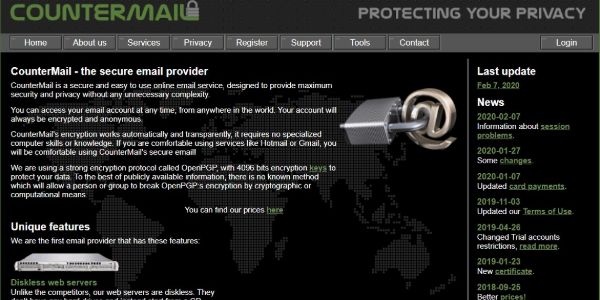
Another thing you can do with CounterMail is configure a USB key to encrypt your emails further.
The decryption key gets stored on the device while the service still requires users to log in to their accounts. That makes decryption impossible, even if a hacker steals your password.
The extra physical security with the USB device makes CounterMail a little less simple and convenient to use than most other secure email services.
You also get IMAP and SMTP access, which you can use with any OpenPGP-compatible email program.
- Does not keep IP address logs
- Includes an integrated password manager (called Safebox)
- All emails and attachments are stored encrypted on secure servers (and without logbooks) in Sweden
- Compatibility with custom domains
- Message filter and autoresponder functions
- Free trial for a limited time. After a week’s free trial of CounterMail, you must purchase a plan to continue using the service. The test includes only 3MB of space
- Expensive than other secure messaging options
5. Hushmail
Hushmail is an encrypted email service designed for users who want a simple app to keep their emails confidential.
The provider uses the OpenPGP protocol to encrypt the content of your emails. It does that by securing connections using SSL/TLS.
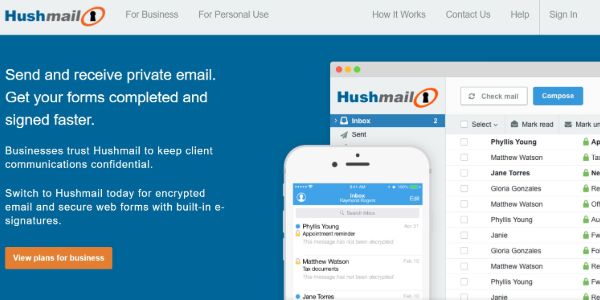
Hushmail is based in Canada, so Canadian laws protect your privacy. The service offers both personal and business plans. You can try any plan for 14 days for free without even providing your credit card information. The annual cost is $49.98.
Learn more about this app through this detailed Hushmail review.
- Optional two-step verification
- Contacts can be imported using a CSV file
- Includes spam filter and autoresponder
- 10 GB of storage
- Must use a different email address as well as a phone number when registering and verifying
6. Runbox
Runbox is a Norwegian company that has offered secure email solutions since 2000. It is regulated by strong laws of privacy and consumer protection deployed within the country.
Runbox Mail Manager is the main product of the company. Unless an order from a Norwegian court requests your data, it will never be shared with any third party without your permission.

They use encryption for communication between servers and do not scan your emails. The provider does not even use cookies to track the use of the service.
Besides, the provider does not store information about your traffic. Instead, it uses SSL security certificates to verify the identities of website links.
Runbox is a paid service that offers a free one-month trial with a 60-day money-back guarantee on all its plans.
- The servers run on renewable energy from hydroelectric power plants
- Up to 100 email aliases
- Up to 25 GB of email storage space
- No completely free account, even with limited storage and features
7. Mailbox
With more than 20 years of being in the business, Mailbox is one of the classics of the sector based in Berlin, Germany. This is another sustainable service powered by green energy.
It boasts a native web client that users can access from anywhere. The email client also offers useful add-ons such as a calendar and task manager.

While the provider offers a paid service only, it has a simple and affordable account for individual users. It also has advanced plans for groups and giant corporations on offer.
- Simple and easy user interface
- 30-day no-risk free trial
- Anonymous, ad-free, and secure
- Powered by eco-friendly energy (100%)
- More expensive than some of the other secure email services available today
8. Posteo
Posteo is an affordable option in this list of secure email providers providing end-to-end encryption. This German-based encrypted email app has been around since 2009.
Although Posteo offers strong built-in encryption options, they also support IMAP. That allows you to use it with different email clients on any device you want.
Posteo goes beyond most email services to protect its users’ privacy by automatically removing IP addresses from emails. So, anyone monitoring your email traffic can neither see the location from which you sent an email nor the sender’s location when you receive one.
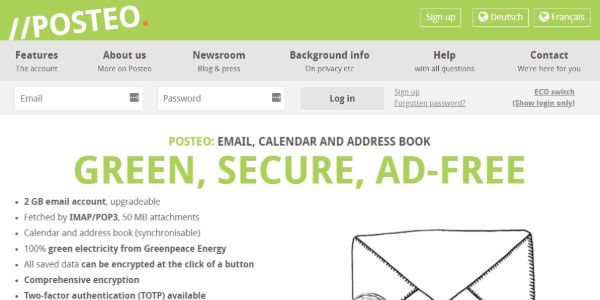
Notably, the service keeps no logs at all.
Besides, the provider allows you to pay for your email account through multiple channels, such as via a bank card, PayPal, or courier. That guarantees an account owner leaves no digital traces when making payments. This makes it a worthy option for journalists, activists, and people living under oppressive regimes.
Moreover, paying with PayPal, a credit card, or any other digital payment separates account information from payment details.
Posteo has no free account, but its entry-level plan offers 2 GB of email storage for €1 per month. If you need more email storage, add an extra gigabyte for €0.25 per month, up to a limit of 20 GB.
- Everything is encrypted in the subject, headers, body, metadata, and attachments
- Mail, attachments, calendar, and contacts are encrypted with OpenPGP on secure servers in Germany
- Supports anonymous payment (in cash)
- Strong commitment to protecting privacy, sustainable energy, and other social initiatives
- Self-funded; good results
- Maximum confidentiality: no logs, deletion of the IP address, secure storage with daily backups
- No spam folder (spam is either rejected or sent to a normal inbox)
9. StartMail
StartMail is a secure email service based in the Netherlands. Privacy enthusiasts operating the private search engine “Startpage.com” manage this service.
It is completely interoperable with other PGP clients due to its integrated use of PGP. That enables the users to send encrypted emails to a non-PGP user who knows a secret question to decrypt the email.
StartMail allows you to create unlimited disposable email addresses (aliases).

It has no dedicated mobile applications. But complete SMTP and IMAP support allow you to use any third-party email application with the service on almost all operating systems, including Windows, Android, iOS, Linux, and macOS.
StartMail doesn’t have a free account but allows you to test its service for free for 30 days.
After the trial, if you wish to upgrade, it will cost you €49.95 (around 57 USD) per year. That stands true whether you choose the “Personal” (10 GB of storage and 10 addresses) or the “Business” (1 mailbox, 10 GB, your own domain) option.
- PGP encryption in one click
- Send encrypted emails to anyone
- Supports two-factor authentication
- Unlimited disposable email addresses
- Complies with GDPR
- Possibility to import contacts from many email services
- IP addresses and hostnames are obscured
- Qualys SSL Rating: A + with HSTS and PFS
- Uses a mixture of open and closed source code
- The Netherlands’ recently adopted surveillance laws might cause privacy issues ahead
10. Disroot
Based in Amsterdam, Netherlands, Disroot provides secure email accounts that you can use on your desktop client or through a web interface.
Communication between you and the mail server is encrypted with SSL. That provides the highest possible level of privacy.

Besides, all emails from your server get encrypted (via TLS protocol), given that the recipient’s email server supports it.
It means, in essence, the emails are no longer sent as a traditional “postcard” but are entered in an “envelope.”
- Free 2 GB storage mailbox
- Allows up to 10MB for document attachment at once
- Accessible by POP3, IMAP, and web page
- Open-source software
- Offers useful additional services, including cloud storage, a social network, forums, and chat
- A project maintained only by volunteers
11. Criptext
Criptext is a free encrypted email service with open-source applications for Windows, Linux, macOS, Android, and iOS devices. The service is still in the Beta phase.
Criptext, the US-based service, began its journey in 2014 as a simple encryption extension for Gmail. It allowed users to have more security in their mailboxes.
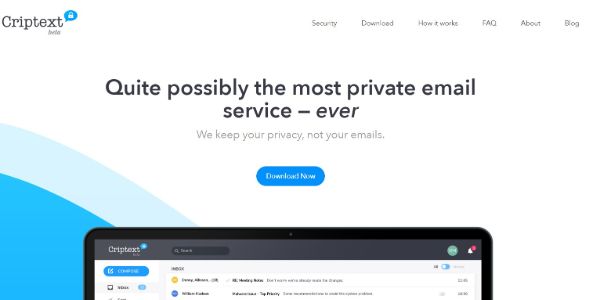
But, in 2015, the company became a victim of state intervention by Panama’s government. This and the increase in privacy invasions worldwide motivated them to create a secure email service like no other.
- One of the pioneers of secure email service solutions
- Completely free
- Allows sending emails to people who do not have a Criptext account
- Unsend email feature
- Stores user information, including name, primary and recovery email addresses, approved devices, and the last active date
12. KolabNow
This Swiss-based company is possibly the most competitive and secure alternative to free email service providers.
Users can access email services and a whole suite of online apps (without adverts). In addition, the provider offers file editors, calendars, and many more features. You can also synchronize the data with all your devices and access it collaboratively, like Google Drive.
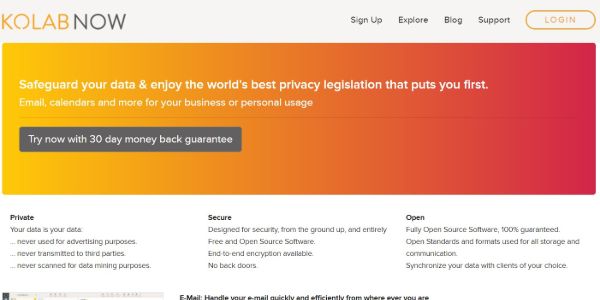
Kolab Now guarantees that your files and data are safe from the interference of ad companies.
There are two packages available for users to choose from. First, a group plan for CHF 9.90 (~USD 11) per user per month that offers custom domain support, admin tools, and support for up to 100 users in a single plan.
The second is an individual monthly plan for CHF 5 (~USD 5.5), including all the aforementioned features. You can also try any option with its 30 days money-back guarantee.
- Open-source program
- Based in Switzerland
- Powerful tagging and text search
- The service only saves its debug report records when necessary
13. FastMail
FastMail is a private mail service based in Australia (it also has US offices). The provider uses encryption for every operation. That includes sending and storing emails, secure file sharing, accessing your account, and everything else.
The company does not participate in or cooperate with any government surveillance program. And they are committed to being transparent with their users if any authority asks them to provide some type of information.

Fastmail is not free. The provider has different payment plans that range from $3 per user per month to $9 for up to 100 GB of storage.
You can try the service for free for 30 days before committing to pay anything.
But, before that, make sure to read their privacy policy in detail, given their jurisdiction (Australia), which is part of the FVEY (Five Eyes) surveillance agreement.
- No hidden or complicated policies
- Simple and easy-to-use interface
- Got launched 20 years ago, back in 1999
- No free plan is available
To learn more about this email service, read our detailed Fastmail review.
14. Librem Mail
Librem Mail is an end-to-end encrypted email service included in the social networking suite Librem One. The service comes from the American tech firm Purism, which also maintains PureOS Linux distribution.
It is among the most private email services out there, using K-9 Mail alongside OpenKeychain. This combination simplifies the use of encrypted mail.
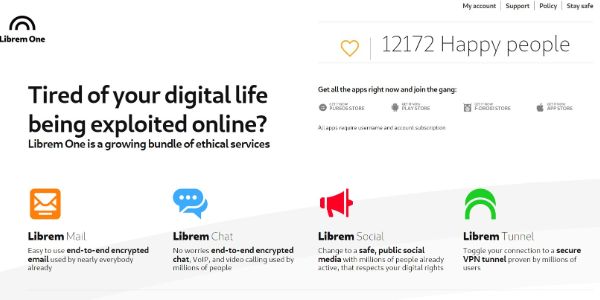
Librem Mail users can exchange encrypted emails with anyone whose email is encrypted using OpenPGP.
The provider offers two premium packages as well as a free plan.
Unfortunately, if you intend to use its secure email solution, the free plan offered by the provider won’t help. Its free plan, dubbed the basic bundle, only offers social and chat services to the users.
The two paid plans range from $7.99 to $14.99.
- Not just secure emails, Librem One, is a one-stop shop for confidentiality and digital security.
- Built-in VPN for maximum security. The Android application uses the code from OpenVPN
- Decentralized
- No ads
- Librem One is entirely based on existing free software projects
15. SCRYPTMail.com
ScryptMail went out of business on January 31st, 2020. The provider deleted entire databases available on all its servers on March 31st, 2020. We included this in our list of best secure email providers because many users might still search for this service even after its discontinuation. So, for that reason, it was appropriate to list it alongside a notice to help people know that it operates no more. And they should not fall prey to any scam because of similar names (if any, ever). The good news is, all the providers listed in this article are quality ScryptMail alternatives anyone can use.
Founded in the USA by a group of people obsessed with security, this private email service provider offered top-level encryption. Before shutting down, it allowed sending encrypted messages to any web user.
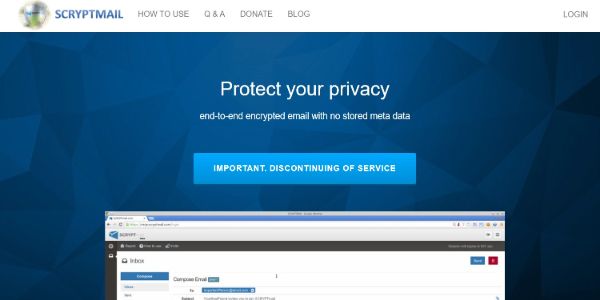
It worked like other secure email services. SCRYPTMail would encrypt metadata on its servers, putting a barrier between hackers (or government agencies) and user data.
- Storage limits were generous, and almost all services offered by SCRYPTMail were free. That is why they were doubly attractive when the service was still available until January 2020
- Accepted Bitcoin, hence supporting anonymous payments
- Paid plans were a little bit expensive
16. Titan
Titan is a customer-centric email service designed to help individuals and business seeking create meaningful customer relationships. This is a promising alternative to mainstream services like Google and Microsoft.
It offers plenty of advanced features to enable you to meet your customers’ requirements, boost technology, and attach rates. Some features include schedule sends, email templates, follow-up reminders, etc.
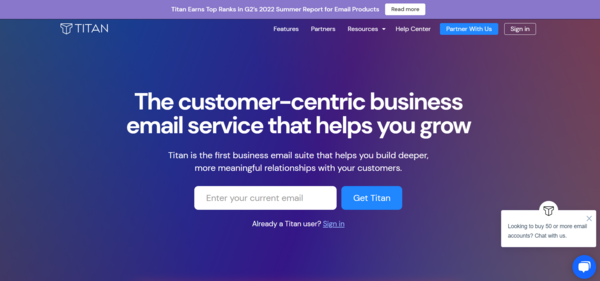
Its calendar, storage, and contact list provide efficiency within the inbox. You can access Titan email through Android, iOS, and webmail.
- Provides storage of up to 10GB
- Has an anti-virus check feature
- Integrated contact, calendar, and email list
- Forwards emails to spam instead of inbox
17. Zoho Mail
Zoho is a reputable professional email provider with excellent features and customization tools. Even the free version has impressive features, while the premium plans are reasonably priced.
Security is essential since you will likely receive sensitive documents through your email. Thankfully, Zoho uses end-to-end encryption on your emails and stores them in its secure servers. Also, it has a secure socket layer (TLS/SSL) to encrypt the connection between your inbox and server. This ensures your communications are private.
Furthermore, Zoho Mail offers more useful features to help you organize your email efficiently throughout your working day. They include a tasks module, calendar module, notes module, and contact module.
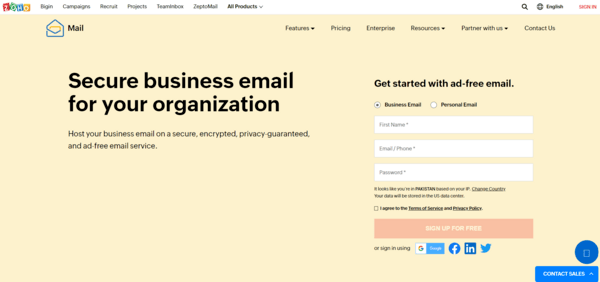
Migrating your documents from one email service to another is a real hassle, and you may lose important data. Zoho Mail has made this process effortless with a one-click migration from popular email clients like Gmail, G-Suite, etc.
- Great collaboration tools
- Free version and affordable plans
- IMAP and POP support
- Not a great solution for personal use
18. TheXyz Mail
TheXyz is another secure email service available on desktop and mobile devices. Its features include SMS password authentication, enhanced text editor, instant push email, deleted message restoration, and SPF protection.
Moreover, the app syncs your calendar, tasks, contacts, and meeting details to help you accomplish your plans. Also, it has a secure IM chat client that enables you to chat promptly on the webmail.
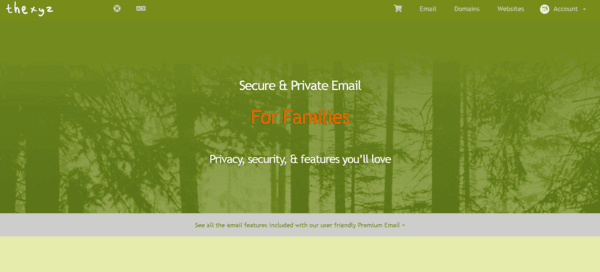
In addition, it allows you to hide your real email address by using many identities to send and receive emails. Some notable features on this ad-free platform include email archive, mobile sync, and cloud drive. Moreover, it has an option for a hybrid-hosted Office 365 email and Microsoft Exchange.
- POP and IMAP encryption
- Calendar and contact sync
- Instant chat application
- A bit complicated to navigate
19. Soverin
Soverin is an Amsterdam-based email service run by a team of internet enthusiasts who aims to create safe and user-friendly products.
Most email services have a reputation for compromising users’ privacy. However, Soverin is trustworthy and transparent, so that it won’t sell your data. In fact, you will only need your phone number to sign up, as the service isn’t interested in your personal information.
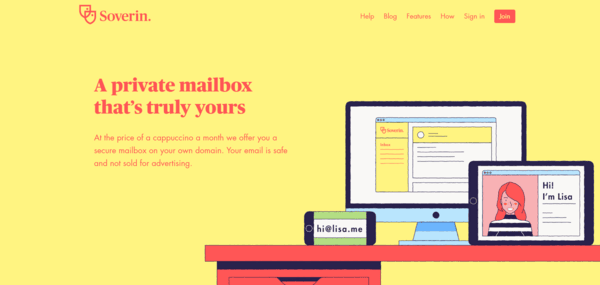
Additionally, Soverin allows you to use your personal web page, and the domain gives you storage of up to 25GB, and lets you send unlimited messages.
- Virtually unlimited messages
- Send and receive unlimited messages
- A+ grade SSL/TLS encryption
- Cloud storage cannot be expanded
20. PrivateEmail
Private Email is a US-based, feature-rich, secure email service. It makes it on this list because of its seamless compatibility across devices.
The service uses the latest and most advanced open-source encryption standards like OpenPGP and AES to protect your communication throughout the delivery. As a result, no one, including the email provider, can access your email content as long as you hold the private keys.
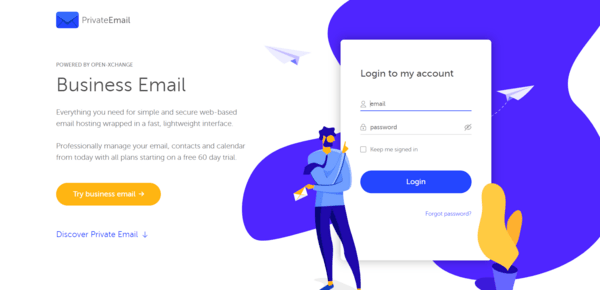
Private Email scores highly in terms of usability. Its Windows, Android, and iOS apps are effortless and allow you to sync your calendars, files, and contacts.
- Compatibility across devices
- Robust PGP encryption
- Excellent cross-device syncing
- Expensive plans
How we tested the best private email providers
We first set up an account with a secure provider and tested the service to see how it functions in various situations, purposes, and conditions. We specifically focused on the security settings to examine the accounts’ security. This includes the encryption rate and account recovery options that cybercriminals may exploit. The goal was to push each secure email provider to discover how beneficial its basic features are and the ease of using more advanced tools.
Additional steps for keeping your emails private and secure
If you use a secure messaging service that boasts end-to-end encryption, you have taken an important step to make your messaging truly secure and private.
To make life difficult for even the most passionate hackers, you can take a few extra precautions:
- Beware of keyboard recording software that captures what you type directly from your keyboard. Such software, dubbed keyloggers, can ultimately defeat encryption if the password is all that a hacker needs to access your account.
- Do not leave your mobile devices and computers unattended. Also, make sure that strong passwords or biometric data protect your devices and do not allow guest accounts or similar unprotected access.
- Be careful of social engineering. Remember, phishing attempts often occur via email, instant messaging, VoIP, or social media. Also, remember that a hacker can design them carefully or adapt them to your case.
- Do not write or share any passwords. Never write down the password that allows you to decrypt secure emails. However, you can store it in a secure password manager.
- Employ two-factor authentication. Combining something you have (authenticator app) with something you know (password/pin) adds an extra security layer.
- Third-party app permission. Verify the apps and devices that have access to your email account regularly. Revoke those you no longer use to reduce potential vulnerability to your account.
- Check filters and forward addresses. This will help ensure your private messages aren’t forwarded to unauthorized addresses.
Wait, isn’t my Email already encrypted?
Some years back, Google improved Gmail’s security by adding the standard Transport Layer Security (TLS) encryption. While this is great, it is a bare minimum, and almost every website nowadays uses HTTPS.
Google claims it doesn’t read your emails. But how does it automatically sync your flight notification with your calendar? Also, it gives permission to mail-readers to use third-party apps.
Moreover, its privacy policy has clauses that explain when it releases your email data to government entities. So, this is a clear indication that it can hand over your information if compelled to do so. Although Apple Mail offers full-on encryption and digital signatures, you must obtain a security certificate. Initially, the certificates were free, but the list is shrinking. When you install the certificate in your keychain, your emails will be digitally signed by default. Also, if the recipient has the certificates, you can send an encrypted message by clicking the lock icon.
Do I have to change my Email address for encryption?
Starting with a new email address is beneficial because it hasn’t been used in the dark web or tracked by data aggregators. However, you must notify all contacts that you’ve changed your address and reset your online accounts. Email providers like Private-Mail, Tutanot, and Private-Mail require you to use a brand-new email address.
The new email address must be unique, as with most email services. Luckily, these providers don’t have millions of users like Gmail and Outlook, so you can use your name without adding numbers and other characters. However, some providers allow you to use your existing email.
Need extra protection? A VPN can help a great deal
Gaining complete internet security is like assembling numerous pieces to complete a puzzle.
A VPN is probably the most vital tool for completing your internet security puzzle for thorough online protection.
A Virtual Private Network (VPN) is a connection method utilized to add privacy and security to public and private networks (e.g., WiFi and the mobile internet).
Using a VPN is becoming popular with corporations and individuals because it protects users’ information while it travels through the internet.
A VPN can increase your privacy to the maximum level possible. That is because you get to change your real IP address with a fake one provided by the VPN provider.
Simply put, the VPN is just a way to join a network without being physically in it.
Advantages of using a VPN
And now that you understand what a VPN is, it’s time for you to know all the benefits of using it:
- Bypass geographical restrictions
- Avoid censorship
- Teleworking
- It makes your browsing more private as a whole
- Encrypts your data transfers
- Masks real IP (hence location)
- Enables users to access the blocked websites
As you can see, alongside enabling you to surf the internet securely, a VPN provides several other benefits.
But here, you might wonder which VPN provider I may use for optimum results. The answer is ExpressVPN (most recommended). ExpressVPN is one of the most renowned companies in the world of VPNs.
But what makes this service distinct from others? Let’s find out quickly.
ExpressVPN
ExpressVPN is a company founded in 2009 in the British Virgin Islands. And as you may have guessed by the name, the firm offers a super-fast VPN service worldwide.
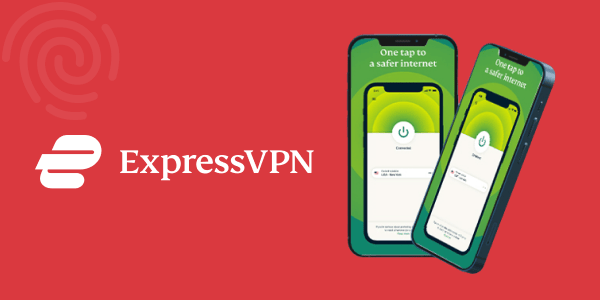
It’s a premium VPN provider that allows you to surf the internet anonymously through a Virtual Private Network (hence its acronym). It boasts apps that are secure, user-friendly, reliable, and well-designed.
What does ExpressVPN offer?
- Super-fast connection speeds: It has more than 3,000 servers spread all over the world. So rest assured you get a faster connection speed regardless of your location.
- Unlimited bandwidth: No bandwidth restrictions for the users means you can browse and download content you love without fear.
- Dedicated applications: This VPN provider works with all the devices on the planet and has dedicated apps for all the major operating systems. That means you can get started with it in a flash.
- Robust data safety: The British Virgin Islands has no data retention laws. That and not keeping records of your activity or connection ensure your privacy.
- Has not been compromised ever: ExpressVPN servers have the latest technology to prevent hacking attacks.
- Money-back guarantee: You have 30 days to get your money back if the service does not meet your expectations. No questions. We tested their money-back promise during our ExpressVPN extensive review, and the service stood true to its words.
FAQs
No, you don’t need a service provider to encrypt your email. In fact, it is possible to protect your email manually. The most popular method is PGP, but everyone you communicate with must set up their emails, too. So, it is much easier to use end-to-end encrypted email services.
Many bad things can happen. For example, they can pretend to be you and request money from your contacts. Also, they can take over your other online accounts associated with the email. So, your email can help a hacker control a significant part of your online life.
It’s easier to determine when your email is hacked but harder to know if someone else is reading your emails. This is because the authorities and other third parties can tap your communication and access your message content. End-to-end encryption helps to stop unintended readers from reading your emails.


